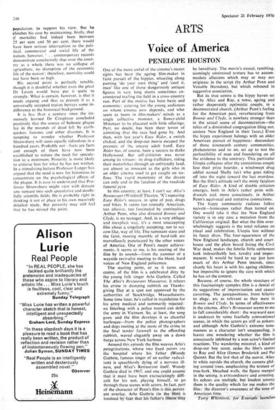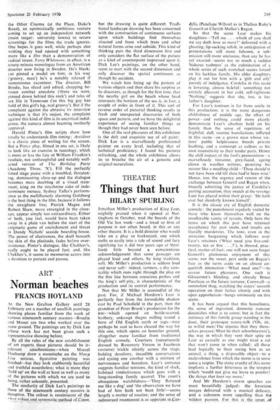ARTS Voice of America
PENELOPE HOUSTON
One of the more awful of the cinema's recent sights has been the ageing film-maker in
faint pursuit of the hippies, wheezing along panting `do your own thing' and `cool it, man' like one of those dangerously antique figures in very long shorts sometimes en- countered trailing the field in a cross-country run. Part of the motive has been basic and economic: catering for the young audiences on whom cinema now depends, and who seem to loom in film-makers' minds as a single collective monster, a flower-child
Minotaur to be placated with little offerings. Part, no doubt, has been sheer terror of admitting that the race had gone by. And then, with last year's Easy Rider, a switch clicked, and the drop-out movie escaped the pressure of the uneasy adult hantl. Easy Rider has, of course. been a success to shake Hollywood. But self-criticism was never among its virtues: its drug-traffickers, riding their motorbikes through an unfriendly land,
are almost as innocent as the girls who in an older cinema used to get caught on ice- floes. The vapid monotony of the dream can only end in the fatalism of the roadside funeral pyre.
In this country, at least, I can't see Alice's Restaurant (Windmill Theatre, 'X') repeating Easy Rider's success, in spite of pop, drugs
and bikes. It seems too rootedly American, too allusive, too fascinated by continuities.
Arthur Penn, who also directed Bonnie and Clyde, is no teenager. And, in a very oblique and inexplicit way, it's a most unaccepting
film about a singularly accepting, not to say cow-like, way of life. The ruminant stare and the faint, mooing mumble of herd-talk are marvellously punctuated by the other voices of America. One of Penn's major achieve- ments, it seems to me, is his steering of the film by its sounds—from the yammer of a wayside revivalist meeting to the blunt, hard voices of New England policemen.
The starting point, or as it turns out centre, of the film is a celebrated ditty by the young folk singer Arlo Guthrie. Called
The Alice's Restaurant Massacree, it relates his crime in dumping rubbish on Thanks-
giving Day at a spot not approved by the authorities of Stockbridge, Massachusetts. Some time later, he's called in trepidation for his army medical and summarily rejected: no litterbug with a police record can defile the army in Vietnam. So, at least, the song goes; and the film develops it as cheerful burlesque—from the police photographers and dogs rooting at the scene of the crime to the final tender farewell to the offending rubbish, waved elegantly away on a dawn barge across New York harbour.
Around this episode the film weaves Arlo's peregrinations, whose two fixed points are the hospital where his father (Woody
Guthrie, famous singer of an earlier radical- ism) is speechlessly dying of a nervous ill- ness, and Alice's Restaurant itself. Woody Guthrie died in 1967; and one could assume
that it must have been excruciatingly diffi- cult for his son, playing himself, to go through these scenes with actors. In fact, part of the character of Penn's film is this persist- ent overlay. Arlo Guthrie (in the film) is haunted by'-fear that his father's Bitten :1h* be hereditary. The movie's casual, rambling, seemingly unstressed texture has to accom-
modate allusions which may or may not originate in the script (by Arthur Penn and Venable Herndon), but which rebound in suggestive association.
But its true centre is the hippy haven set up by Alice and Ray, a tense, ageing and rather desperately optimistic couple, in a deconsecrated church. (Arthur Penn's feeling for the American past, reverberating from Bonnie and Clyde, is nowhere stronger than in the actual scene of deconsecration—the relics of a diminished congregation filing out, austere New England in their faces) Even the hippy experiment belongs with an older American pursuit of happiness: descendant of those nineteenth century communities, phalansteries and so on, set up to test the perfectibility of man and foundering on all the evidence to the contrary. This particular Utopia collapses after the contentious couple lose their prize boarder, a windswept drug addict named Shelly (sic) who goes riding off into the night toward the last overdose. But the film's attitude isn't the-misty fatalism of Easy Rider. A kind of double criticism emerges, both in Arlo's rather prim with- drawals and, more consciously, in Arthur Penn's equivocal and tentative connections.
The hippy community radiates folksy naiveté—homespun rather than turned on. One would take it that the New England variety is in any case a mutation from the Californian original. But what the film over- whelmingly suggests is the total reliance on ritual and celebration, Utopia lost without its fancy dress. The four-squareness of the New England landscape, church and court- house and the plain board listing the Civil War dead, makes the febrile little settlement look indescribably lost, tawdry and imper- manent. It would be hard to say just how much of this Arthur Penn intends, since clearly his heart is with his ageing children; but impossible to ignore the care with which he has set the context.
Because, of course, the whole structure of this fascinatingly c9mplex film is a denial of its suggestions of improvisation and casual cavorting. The juxtapositions, from hilarity to elegy, are as relevant as they were in Bonnie and Clyde. In terms of effectiveness in the cinema. Alice's Restaurant seems to me to fall considerably short: the wayward ease is undercut by some fearfully conventional scenes, in which the actors go stiff as pokers; and although Arlo Guthrie's extreme tenu- ousness as a character isn't unappealing, it leaves one wondering whether the film is consciously inhibited by a non-actor's limited reactions. The wandering minstrel, a kind of drop-out boy scout, cedes the film's centre to Ray and Alice (James Broderick and Pat Quinn). But the last shot of the movie. Alice in white outside the church, the camera glid- ing around trees. emphasising the texture of tree-bark, bleached walls, the figure merged in the setting. is extraordinary and arresting. Its echoes are multiple, but loudest among them is the quality which for me makes the film: the director's awareness of the tone of American time.
Thiry' Whittithie, for Example launches the Other Cinema (at the Place, Duke's Road), an optimistically ambitious venture aiming to set up an independent network (main target: university towns) to secure screenings for the films the trade ignores. One hopes it goes well; while perhaps also wishing they had opened with something more like a film than a demonstration of radical intent. Terry Whitmore, in effect, is a ninety-minute monologue from an American deserter now living in Sweden. He's black; LBJ pinned a medal on him; in his way ('groovy, man') he's a notably relaxed if monotonous raconteur. The director, Bill Brodie, has sliced and edited, chopping be- tween combat anecdote ('there we were, pinned down behind this rock') and tales of sex life in Tennessee ('so this big guy has hold of this girl's leg, real groovy'). But if the complaint against the abrasive TV interview technique is that it's unjust, the complaint against this kind of film is its uncritical indul- gence, the camera almost beaming motherly approval.
Harold Pinter's film scripts show how totally he understands film timing: Accident is a classic piece of writing for the screen. But a Pinter play, filmed in one set, is likely to look like an exercise in tautology, which is more or less the fate of William Friedkin's resolute, not unthoughtful and notably well- acted version of • The Birthday Party (Academy Three, 'X'). Fill the perfectly timed stage pause with a troubled, threaten- ing, domineering close-up and the dialogue becomes mere doubling of a visual state- ment, icing on the strychnine cake of inde- terminate menace. Sydney Tafler's perform- ance as the mellifluously alarming Goldberg is the best thing in the film, because it follows the straightest line; Patrick Magee and Robert Shaw, more entangled in the close- ups, appear simply too extraordinary. Either or both, you feel, would have been taken away in a plain van before the start of the enigmatic game of encirclement and threat in Dandy Nichols' seaside boarding-house. The power of elusiveness, the skull beneath the skin of the platitude, fades before over- insistence. Pinter's dialogue, like Chekhov's, really ought to be played fast; and, like Chekhov's, it seems to mesmerise actors into a devotion to portent and pauses.



































 Previous page
Previous page